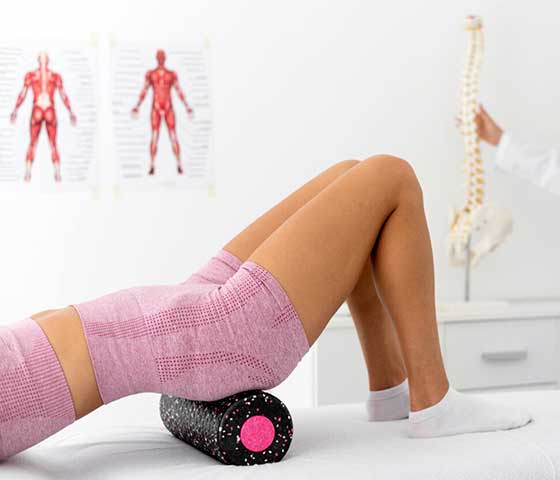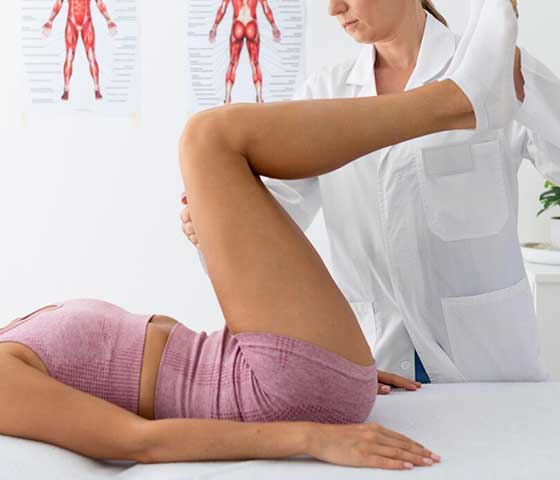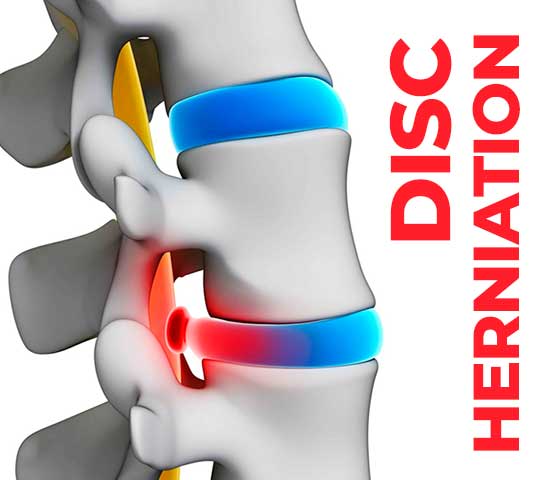A disc herniation, also known as a slipped or ruptured disc, occurs when the soft gel-like center of a spinal disc pushes through a crack in the tougher exterior casing. This condition can cause pain, numbness, or weakness in an arm or leg, depending on the location of the herniated disc and whether it compresses any of the spinal nerves.

Physiotherapy is a key component in the management of disc herniation, offering non-surgical solutions to alleviate pain and improve function. Also, physiotherapy plays a critical role promoting recovery, and preventing future injuries.
If you are suffering from disc herniation pain, physiotherapy can be an effective way to manage symptoms and maintain a good quality of life. At Revolve Physiotherapy, our team will develop an exercise program tailored to the individual’s specific needs and abilities.
See the main causes of Disc Herniation:
Age-related wear and tear: As people age, their spinal discs lose some of their water content, making them less flexible and more prone to tearing or rupturing.
Injury: A single excessive strain or injury can cause a disc to herniate.
Lifting improperly: Using the back muscles instead of the legs to lift heavy objects can lead to disc herniation.
Genetics: Some people inherit a predisposition to developing a herniated disc.
Here’s an overview of the physiotherapy approach to disc herniation:
Initial Assessment and Diagnosis
- Medical History and Symptoms: Collecting detailed information about the patient’s pain, functional limitations, and any contributing factors.
- Physical Examination: Assessing range of motion, muscle strength, reflexes, and neurological signs.
- Imaging Studies: If necessary, confirming the diagnosis with MRI or CT scans.
Goals of Physiotherapy
- Reduce pain and inflammation.
- Improve mobility and flexibility.
- Strengthen muscles supporting the spine.
- Educate the patient on proper body mechanics and posture.
- Prevent recurrence of the condition.
Pain Relief and Inflammation Reduction
- Heat and Cold Therapy: Alternating hot and cold packs to reduce pain and inflammation.
- Electrical Stimulation: Techniques like TENS (Transcutaneous Electrical Nerve Stimulation) to alleviate pain.
- Manual Therapy: Gentle mobilization techniques to improve spinal alignment and reduce muscle tension.
Therapeutic Exercises
- Stretching: Gentle stretches to improve flexibility and reduce muscle tightness.
- Strengthening Exercises: Targeting core muscles to provide better support to the spine.
- Aerobic Conditioning: Low-impact activities like walking, swimming, or cycling to improve overall fitness without stressing the spine.
Posture and Body Mechanics Education
- Ergonomic Advice: Guidance on proper sitting, standing, and lifting techniques to minimize stress on the spine.
- Postural Correction: Training to maintain proper alignment during daily activities.
Education and Lifestyle Modification
- Activity Modification: Advice on avoiding activities that exacerbate symptoms and incorporating spine-friendly practices.
- Weight Management: Guidance on maintaining a healthy weight to reduce spinal load.
A herniated disc can significantly impact daily life, but with appropriate treatment and preventive measures, many people can find relief and return to their normal activities.

Physiotherapy for disc herniation focuses on a comprehensive approach combining pain management, exercise, education, and lifestyle modifications. Individualized treatment plans help patients recover effectively and prevent future episodes. It is crucial to work closely with a physiotherapist to ensure a safe and effective recovery process.
Disc Herniation Physiotherapy in Milton at Revolve. Don’t wait any more, find pain relief! Call us now 905 864.8181 and talk to one of ours Specialist.
